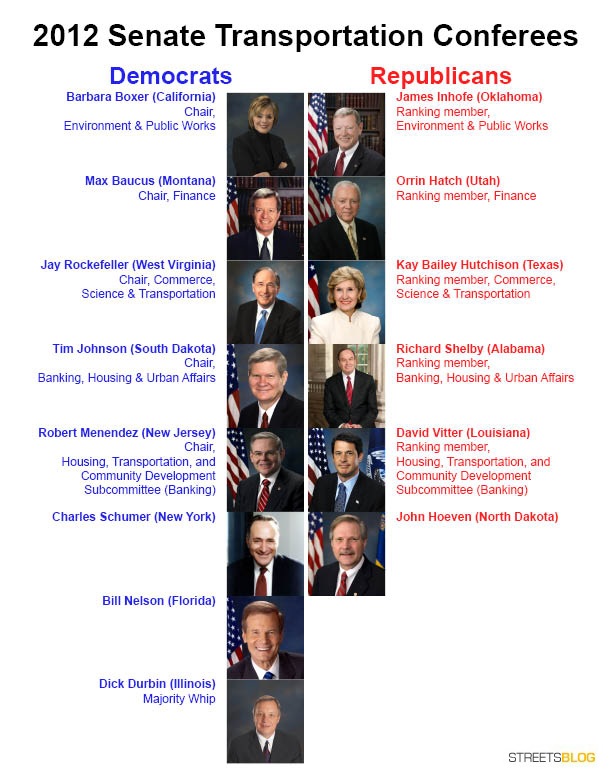The Senate unveiled its list of conference committee delegates yesterday to a widespread lack of surprise.
Ten of the 14 conferees are either chair or ranking member of a committee (or subcommittee) charged with writing part of the Senate transportation bill. Their job will be to defend their work from a House delegation that has not yet been named as of this writing.
The two sides will be negotiating four big things, with little common ground: The length of the bill, the environmental review process, the Keystone XL pipeline, and the RESTORE Act (directing money to cleaning up the Gulf Coast). Here's what each of the two chambers brings to the table in terms of each issue:
- The House brings a 90-day bill that extends the current program structure, weakens environmental review, deregulates coal emissions, requires approval of the Keystone pipeline, and includes the RESTORE Act.
- The Senate brings a two-year bill that consolidates current programs, weakens environmental review but to a lesser degree, is silent on coal ash and the Keystone pipeline, and includes the RESTORE Act.
So what does the list of Senate conferees tell us? Not a whole lot. The Senate list is not expected to be as interesting as the House list, since that roster could speak volumes about how much hardball they intend to play. For now though, the Senate has the high ground, and a glance at a few key recent votes offers some insight into their strategy.
A Two-Year Bill
13 of the 14 Senate delegates to the transportation bill conference committee voted "yes" on MAP-21 -- and the 14th, Orrin Hatch (R-UT), didn't vote, so none of the conferees voted against it. House Republicans who characterize the Senate bill's pay-fors as insufficient are not likely to find any help from Republican Jim Inhofe, who vigorously defended the bill's funding during floor debate.
Environmental Review & Coal Ash
The House rider restricting the regulation of coal ash could find a likely ally in Jay Rockefeller of West Virginia, where the coal lobby commands a lot of influence. That said, Rockefeller did vote against a partial deregulation amendment to the Senate bill -- an amendment that garnered a majority of votes but fell short of the 60-vote threshold imposed on non-transportation-related issues.
As for environmental review, the Senate bill does not come anywhere close to the assault on the National Environmental Policy Act that the House recycled from H.R. 7. The closest the Senate came in debating their own bill was a non-binding "sense of the Senate," to which all conferees (except Hatch) agreed, urging environmental review to be completed as quickly as possible in the aftermath of natural disasters.
Keystone XL
As we noted yesterday, Senator Hoeven's Keystone XL pipeline amendment to S. 1813 received a majority when it came up for a vote in February, but fell short of the 60 needed to pass. The 14 conferees were split down the middle on that vote, with all six Republicans voting "aye" and all but one Democrat voting "no" -- Max Baucus was the lone "aye" among Dems.
The lineup could have been designed to allow one Democrat to defect without throwing the balance into the pro-pipeline camp. Senate Majority Leader Harry Reid has made it clear that he is standing firm against Keystone, and everyone I've talked to believes he means business. Reid would not risk putting President Obama in the uncomfortable situation of having to choose between vetoing a long-overdue and generally popular bill and admitting defeat on Keystone.
RESTORE Act
The RESTORE Act was attached to the Senate bill in the form of an amendment proposed by Democratic conferee Bill Nelson of Florida. The amendment passed the Senate by a vote of 76-22, receiving the support of nearly all the conferees -- the lone "no" vote belonged to Orrin Hatch.
RESTORE has generally enjoyed bipartisan approval wherever it goes, and the presence of Nelson and fellow Gulf-Coasters Vitter (LA) and Shelby (AL) on the committee would seem to indicate sustained support for the measure. They may be willing to abandon some more controversial proposals to see RESTORE enacted.






